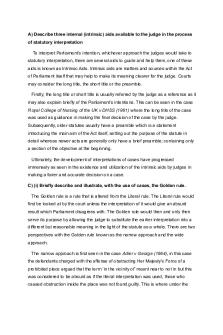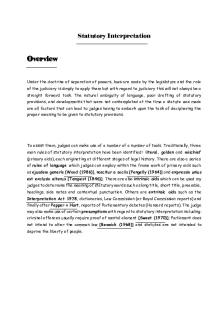Common law presumptions in statutory interpretation PDF

| Title | Common law presumptions in statutory interpretation |
|---|---|
| Course | Law and Global Studies |
| Institution | Monash University |
| Pages | 3 |
| File Size | 99.7 KB |
| File Type | |
| Total Downloads | 90 |
| Total Views | 154 |
Summary
Download Common law presumptions in statutory interpretation PDF
Description
The issue of retrospectivity in statutory interpretation What do we mean by retrospective operation of legislation? Retrospectivity provides that ‘the law at a past date is taken to be that which it was not’.
There is a general common law presumption against retrospectivity. See Maxwell v Murphy (1957). ‘The general rule of the common law is that a statute changing the law ought not, unless the intention appears with reasonable certainty, to be understood as applying to facts or events that have already occurred in such a way as to confer or impose or otherwise affect rights or liabilities which the law had defined by reference to the past events.’
Accrued rights and liabilities Where statute law is changed by the amendment or repeal of an Act or subordinate instrument, rights and liabilities that ‘accrued’ under the old statute are preserved: s 14(2) and s 28(2) Interpretation of Legislation Act (Vic) Byrne v Garrisson, 1965: Accrued liabilities includes criminal liabilities, so an offence against a statute can be prosecuted after its repeal When do you use the presumption against retrospectivity? If the Act itself states that it is intended that there be retrospective commencement– obviously, then there is no room for the presumption against it. If common law rights and liabilities are affected, rely on the common law presumption. If ‘accrued’ statutory rights or liabilities are affected by the repeal, amendment or expiry of a statute or a subordinate instrument, use s14(2) or s28(2) ILA. Exceptions There are various exceptions to the use of the presumption against retrospectivity. First exception: Where the Act merely uses past conduct as a foundation for determining present fitness to do something and the Act is directed to protecting the public interest rather than punishing for the conduct. o Geschke v Del Monte Home Furnishers Pty Ltd, 1981 o Re a Solicitor’s Clerk, 1957 Second exception: Procedural changes o The presumption against retrospectivity applies only to laws which affect substantive rights or liabilities, as opposed to the procedure for exercising or enforcing them: Maxwell v Murphy o So, there is no presumption against retrospectivity in the case of statutes which affect mere matters of procedure. o
Substance and procedure o
Rodway v R, 1990: A person charged with a crime has no accrued right to be tried in any particular way; only a right to be tried in accordance with the procedure prevailing at the time of the trial.
Summary of presumption against retrospectivity Unless expressly provided otherwise in the Act, an act is presumed not to apply retrospectively, i.e. to facts or events that occurred before the Act commenced But substantive rights and liabilities that arose under repealed Acts are preserved under a new Act (s 14(2) ILA; s 28 for regulations) - Rights - Maxwell v Murphy - Liabilities - Byrne v Garrison The presumption against retrospectivity does not apply to: - Matters of procedure – Rodway v R; Maxwell v Murphy - To past conduct relevant to determine present fitness for public interest – Geschke; Re Soliticitor’s Clerk Common law presumptions in statutory interpretation Common law presumptions Presumptions: presumptions we can make based on common law maxims that we can bring into being when we can interpret legislation. How strong are presumptions? Coco v R (1994) - it was held that, normally, clear words need to have “an unmistakeable and unambiguous intention” in order to limit a fundamental freedom. The principle of legality Unless the Parliament makes unmistakeably clear its intention to abrogate or suspend a fundamental freedom, the courts will not construe a statute as having that operation. Other common law presumptions Consistent use of words is presumed
Where a word is used in more than one place in a piece of legislation, the court will presume it is intended to have a consistent meaning in all contexts unless the contrary intention is clear.
All words should have a meaning
Presumption that drafters of legislation chose words carefully and didn’t include words unless they are meant to add something.
No interference with fundamental rights
Presumption that a statute has no intention to interfere with fundamental rights unless the statute specifically says that it does.
Coco v R (1994)
No intention to violate international law
Presumed that in passed legislation in Australia, the parliament doesn’t intend to legislate contrary to recognised international rules.
Retrospectivity generally not intended
General presumption that retrospectivity is generally not intended.
Presumption that legislation does not deprive people of access to the courts.
If legislation is ambitious and it looks like you may not be able to access a court in relation to that legislation, it should be interpreted that you can.
Presumption that re-enactment constitutes approval of previous interpretation. Presumption that legislation does not bind the Crown.
Controversial: Presumption that the crown is not covered by its own legislation.
Watered down- should not be raised in front of courts anymore
Presumption that penal provisions are strictly construed.
Any lack of clarity in a provision which provides a penalty should be resolved in favour of the defendant.
Presumption that property rights are not taken away without compensation.
Commonwealth v Hazledell 1918
Presumption that legislation does not have extra-territorial effect.
Parliament can do this but it must have constitutional power to do so.
Presumption that if an Act purports to give effect to an international agreement, the court is at liberty to look at that agreement.
Yager v The Queen
Various other presumptions - see FOL book paras 11.33-11.40 Interpretations of similar words in related jurisdictions May look at previous interpretations of similar words in other legislation, but… context and purpose are still the most important consideration....
Similar Free PDFs

Statutory Interpretation in Malaysia
- 12 Pages

Statutory Interpretation
- 6 Pages

Statutory Interpretation
- 6 Pages

Statutory Interpretation
- 3 Pages

Statutory Interpretation
- 5 Pages

Statutory Interpretation
- 11 Pages

Statutory Interpretation
- 6 Pages

Statutory interpretation notes
- 2 Pages
Popular Institutions
- Tinajero National High School - Annex
- Politeknik Caltex Riau
- Yokohama City University
- SGT University
- University of Al-Qadisiyah
- Divine Word College of Vigan
- Techniek College Rotterdam
- Universidade de Santiago
- Universiti Teknologi MARA Cawangan Johor Kampus Pasir Gudang
- Poltekkes Kemenkes Yogyakarta
- Baguio City National High School
- Colegio san marcos
- preparatoria uno
- Centro de Bachillerato Tecnológico Industrial y de Servicios No. 107
- Dalian Maritime University
- Quang Trung Secondary School
- Colegio Tecnológico en Informática
- Corporación Regional de Educación Superior
- Grupo CEDVA
- Dar Al Uloom University
- Centro de Estudios Preuniversitarios de la Universidad Nacional de Ingeniería
- 上智大学
- Aakash International School, Nuna Majara
- San Felipe Neri Catholic School
- Kang Chiao International School - New Taipei City
- Misamis Occidental National High School
- Institución Educativa Escuela Normal Juan Ladrilleros
- Kolehiyo ng Pantukan
- Batanes State College
- Instituto Continental
- Sekolah Menengah Kejuruan Kesehatan Kaltara (Tarakan)
- Colegio de La Inmaculada Concepcion - Cebu







